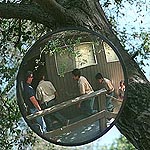The Sacramento Bee
|
Oversight of other states is urged By Sam Stanton and Mareva Brown Bee Staff Writers (Published June 30, 1998) Concerned by the lack of oversight of California youths in out-of-state reform programs, state lawmakers said Monday they want to force California regulators to inspect and license camps in other states. They also expressed astonishment at how little knowledge California officials have of how such camps operate and how California youth are sent to them. "That's bizarre," said state Sen. John Vasconcellos, D-Santa Clara, who chairs the Public Safety Committee. "Somebody ought to be watching the store." The comments came Monday amid a juvenile justice subcommittee hearing, scheduled weeks ago but that closely paralleled the findings in a three-month Bee investigation of problems in the state's system of sending juveniles to other states. The three-day series concludes today. "It's a very vexing issue that has plagued this institution for a number of years," Sen. Mike Thompson, D-St. Helena, who is sponsoring a bill that would require California officials to oversee out-of-state placements, told the panel. "Recently, it's all come to a head. You don't have to go far to see that -- the last two days' front-page articles in The Sacramento Bee." Thompson's bill, SB 933, would put into practice some 50 recommendations by a task force on foster care. They are part of a reform package being rushed through the Legislature after revelations of major problems in the state's system. Much of it focuses on oversight of children who are placed in foster or group homes. Thompson, chairman of the Senate Budget Committee, said later that he believes out-of-state programs should not be allowed to house California youths unless they meet the same standards as this state's group homes and other programs. And, he added, The Bee investigation brought attention to shortcomings in the system, which will mean "it's going to be easier to do something than it might have been" to reform the system.
But they had difficulty eliciting answers about the most controversial aspect of the out-of-state programs -- the fact that such privately run programs may use physical force against youngsters, something that is barred inside the state. Schiff asked an official from Rite of Passage, the Nevada-based agency that houses youths in a camp in the high desert, what sort of force would be used against a juvenile who refused to go on a hike. Instead of answering, ROP official Sean Doak began a lengthy response dealing with other policy issues until Schiff interrupted and told him he was being "unresponsive." Eventually, ROP officials described the process they would use to escort such a juvenile by picking him up by the arms and isolating him until he was cooperative. Such tactics are at the heart of the controversy over sending youths to other states for rehabilitation, and probation officers and judges told Schiff they could not deal with all their troubled youths unless they are sent to such programs. But officials from other counties that refuse to export children, including Contra Costa and Los Angeles, said that there are better alternatives and that it is important to keep youngsters closer to home for rehabilitation. Thompson's bill would allow the continuation of out-of-state placements, but only after the state Department of Social Services visited each program and licensed it to accept California children. Those that use tactics illegal in California -- such as physical force to prevent escapes -- could get waivers. However, several advocates for such programs said they had little confidence that such waivers would ever be granted. Instead, they said, the restrictions effectively would kill California's participation in their programs. "We'll lose that option," said Ray Wingerd, chief probation officer for San Bernardino County, which sends more youths out of state than any other county. "I believe it's quite subtle in the language (of the bill). I don't believe they will certify them." After 16-year-old Nicholaus Contreraz of Sacramento died in March at the Arizona Boys Ranch, questions arose about the lack of oversight of delinquents sent out of California by courts and probation officers. Now there is no state oversight of the roughly 880 youths placed in some 18 programs in at least eight states, according to state Department of Social Services statistics released Monday. Those numbers, from a survey this month, indicate that in the three months since Contreraz died, out-of-state placements have dropped by more than 100 -- a reversal of the trend -- and the number of facilities used has increased by five. The shift may be attributed, in part, to a freeze on new placements to the Arizona Boys Ranch since the death. Arizona officials are expected to announce today that they will extend the ranch's license to operate until a probe of the death is completed. The license expires today. Thompson's bill would force facilities to notify California's Department of Social Services whenever an allegation of abuse is made, in addition to notifying the sending county and their own home state. The Bee series revealed that some states will not release such information to California. The series also found that California authorities rarely ask for it. "DSS complains bitterly that they don't have good access to records out of state (but) we can't make other states change their rules to let us have access to their files," said Senate Budget Committee consultant Pat Leary.
"The only thing we can do is make the providers provide the information if they want to accept California kids."
|
| ||||||
Copyright © The Sacramento Bee | |||||||
� 1996-8
[email protected]

 Who's guarding the kids?
Who's guarding the kids?

